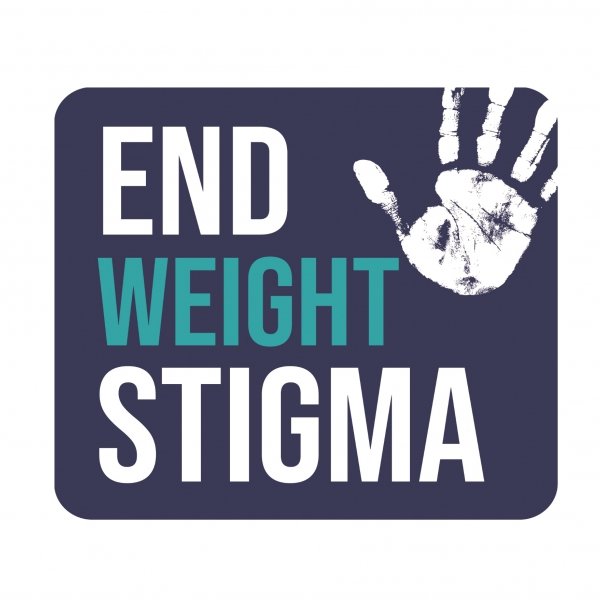Weight Stigma Awareness Week 2025:Ways to Make a Change in the Healthcare Field
9/24/25 | By: Carissa Hannum
Weight Stigma Awareness week was created in 2011 to end weight discrimination and anti-fat bias. Weight Stigma Awareness week provides education and resources around how weight discrimination is pervasive in all systems of life and can lead to negative health outcomes. This year, Weight Stigma Awareness week takes place on September 22nd to September 26th. This year’s theme is “Healing Without Harm: Ending Weight Stigma in Healthcare”. There are several events and resources throughout the week, which can be found at https://weightstigmaawarenessweek.org/.
What is Weight Discrimination?
Consistently, those in larger bodies experience stigma. These individuals experience consistent discrimination due to their appearance in all areas of life. Many individuals consistently look down upon higher-weight bodies and make quick judgments about what a person’s body means. Generally, these beliefs include thinking that those in larger bodies are lazy, unhealthy, lack willpower, or are even considered unintelligent. Because of this assumption, those in larger bodies experience inequalities in all areas of life, including education, work, and interpersonal relationships. Examples include:
Hiring discrimination
Gaps in wages
Lack of promotion or acceptance in educational programs
Rejection from peers as well as a lack of social acceptance due to stereotypes about larger bodies
Lack of proper diagnosis or withheld medical treatments
Less preventative care for health issues
Frequent bullying in educational settings or other social settings with peer groups
Those in larger bodies may experience more disciplinary actions or contract terminations at work
Weight stigma and fat-bias can lead to inequalities and disparities in all areas of life. These stereotypes and discrimination can negatively impact the quality of life as well as mental and physical health outcomes.
How Does Weight Discrimination Affect an Individual’s Quality of Life?
Weight stigma and weight discrimination can lead to both negative physical and mental health outcomes, including:
Mental health issues
Mental health issues that are reported by those in larger bodies are anxiety, depression, bullying, low self-esteem, and negative body image/ negative self-perception.
Individuals with higher body weight are 2.5 times more likely to suffer from mental health issues like anxiety and depression (link to research).
Continued Weight Gain
Weight gain does not inherently mean there is a problem. I highlight this fact to help understand that common "prescriptions" around weight don’t work. Consistent judgment or comments from others that higher weight individuals just “need to lose weight” can actually lead to continued weight gain or weight cycling.
Bullying and discrimination can lead to higher cortisol levels, anxiety, and difficulty with emotional regulation, which can cause the body to gain weight due to nervous system overwhelm.
Poor Healthcare
Frequently, those in higher weight bodies do not receive appropriate medical care, receive inappropriate diagnoses, or have poor treatment outcomes.
Lower Socioeconomic Status
Due to discrimination at work and education, people with fat bodies can experience lower socioeconomic status due to poor advancements at work, discrimination during interviews, and wage gaps.
Each individual’s experience of discrimination is different, and so although the above are examples of mental health and physical health outcomes, there are many more ways that fat-bias can affect an individual's quality of life.
How Does Weight Discrimination Affect Healthcare?
Unfortunately, weight discrimination is pervasive within healthcare. A 2005 study reported that 53% of individuals in fat bodies received judgmental comments about their weight from health professionals. As a therapist in the mental health field, we are taught the importance of the relationship to lead to positive outcomes and changes. Weight discrimination within the health care industry can lead to less rapport and connection-oriented relationships.
Due to less rapport and relationship building, patients in larger bodies report negative quality of life outcomes, including doctors spending less time in the room, difficulty receiving appropriate diagnosis, inappropriate recommendations (i.e. a weight loss prescription versus a treatment regimen that may be more helpful). Frequently, due to the negative comments, judgments, and difficulty receiving appropriate help and support with medical complaints, those in larger bodies can actually avoid the doctor, leading to even worse outcomes and quality of life.
What Changes Need to be Made in Healthcare to Combat Weight Discrimination?
There are several ways that the healthcare field could work towards ending anti-fat bias and
weight stigma, which should include exploring and incorporating the following:
Dropping the use in the healthcare setting
BMI was actually created by a mathematician rather than an individual within the healthcare setting. Research around the development and standardization of weights within BMI has racist and discriminatory roots.
Most of the research used to create BMI utilized white participants, and does not account for individual differences including race, ethnicity, gender, sexuality, and socioeconomic status.
Rather than utilizing a standardized measure of what should be considered a “healthy weight”, individual differences should be explored in the medical office, including weight discrimination and lived experiences.
Allowing for a more holistic approach to medical issues for those in fat bodies
Unfortunately, many individuals with fat bodies have experienced snap judgments about their bodies, appearance, and medical issues based on BMI.
A holistic approach to medical treatment should include listening to patients and trusting that patients understand their own bodies.
A partnership and appropriate rapport building need to be created in medical settings to allow clients to self-advocate, share their concerns, and create a plan for treatment together.
Better treatment and training around how anti-fat bias can affect medical outcomes
Because medical professionals are trained in the use of BMI, most of the training medical professionals experience incorporates fat bias and weight discrimination.
Training programs should begin to incorporate training associated with the negative effects of weight discrimination and how weight discrimination can affect physical and mental health outcomes.
Allowing for patient self-advocacy and patient voices in medical choices and treatment decisions
Doctors and other medical professionals should allow for a team approach to a client’s healthcare.
Asking questions that allow patients to share their feelings and reactions around treatment planning, diagnosis, and other aspects of healthcare recommendations is needed.
Teaching health care providers and patients about the negative quality of life outcomes associated with diet culture, dieting, and weight cycling behaviors
Frequent treatments for non-weight-related complaints in larger bodies.
Individuals tend to be recommended to “lose weight”. Not only is this recommendation harmful, but it can also increase disordered eating patterns.
Many individuals will put themselves in a state of starvation mode to lose weight. Unfortunately, these "prescriptions" do not realize that when clients diet, starve themselves, or follow diet culture prescriptions, they fail to realize that patients are more likely to gain weight. This causes weight cycling, which can lead to negative health outcomes.
Understanding that anti-fat bias is just as concerning or even more concerning than the “obesity epidemic”
Not including research as to how anti-fat bias can affect physical and mental health is dangerous and can continue to perpetuate negative health issues.
More funding is needed for research on weight discrimination. The “obesity epidemic” has continued to perpetuate this discrimination rather than investing in physical and mental health care for larger-bodied individuals’ specific healthcare needs.
As I’ve stated above, weight discrimination can lead to self-blame and shame and actually lead to avoidance of doctors and other health professionals, which can cause worse physical and mental health outcomes.
The way the “obesity epidemic” currently frames an individual not going to the doctor is through judgment rather than exploring how the system may be perpetuating these negative health outcomes.
Exploring and developing knowledge around how body stereotypes can lead to inappropriate treatment of all health issues, as well as eating disorders
Eating disorders do not discriminate based on body size. A client can have any body size and experience any myriad of eating disorder symptoms.
Whenever the medical field puts the entire weight of blame on a patient's medical issues, a cycle of self-shame is created.
Self-blame and shame can increase negative behaviors, including eating disorders.
Weight-based guidance and BMI can actually inhibit necessary treatment for those with eating disorders and other health issues. This needs to be reevaluated.
What Are Ways that I can Combat Weight Discrimination and Anti-Fat Bias?
Weight Stigma Awareness Week offers the following suggestions for ways individuals can get involved as well as fight against weight discrimination:
Create training for community members, schools, and workplaces around weight discrimination.
Create petitions and letters for lawmakers.
Engage in self-reflection around how weight stigma has affected your own life, as well as how your own bias may affect your choices.
Other ways to educate and advocate for yourself and others:
Use preferred language around body types.
When discussing a person’s body, and only discuss one’s body when necessary, use terms like larger-bodied or at a higher weight. Some individuals may prefer the term fat to describe their body.
Take time to ask the individual what term they would prefer.
The term obesity is not preferred and should not be used.
Speak up if you notice weight-based bullying or inappropriate language and stereotypes.
We can only change stereotypes if we are willing to be an ally and advocate against this discrimination
Advocate against your own weight bias or others.
If a friend or family member makes an inappropriate comment, don’t be afraid to share how their comments affect you.
Take some time to educate them about your needs.
If you have an opportunity to educate others about weight discrimination, take it!
Advocate for school policies around weight-related bullying.
Explore and advocate for weight-related discrimination policies at your workplace.
Advocate for yourself within healthcare settings.
Take time at the beginning of your appointments to discuss how you
would like your weight to be discussed.
If this medical professional is unwilling to discuss your preferences, ask for another provider who will!
Weight in the Media can perpetuate discrimination.
Know that the media has unrealistic ideals of weight.
Speak out against weight-related discrimination in the media.
Reach Out
If you’re considering professional support, we’re here to help. Please reach out to schedule a free, no-commitment consultation. There’s no fee and no obligation—just click the button below to get started.
You can also call or text us at 202-656-3681 or email us directly. Give yourself the opportunity for the support you deserve.







